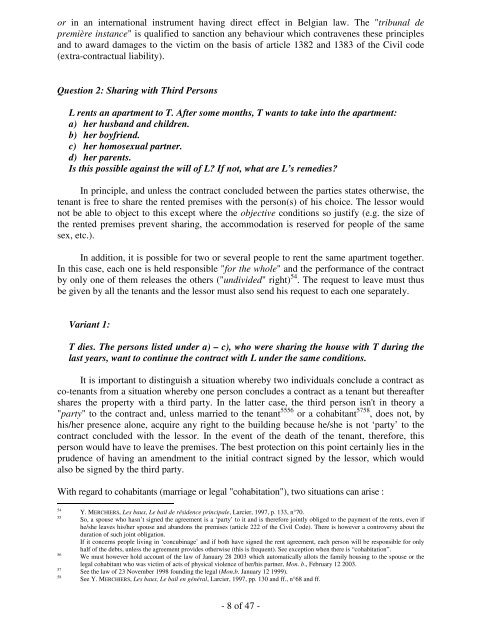- 1 of 47 - BELGIUM Catherine DELFORGE and Ludivine ...
- 1 of 47 - BELGIUM Catherine DELFORGE and Ludivine ...
- 1 of 47 - BELGIUM Catherine DELFORGE and Ludivine ...
Create successful ePaper yourself
Turn your PDF publications into a flip-book with our unique Google optimized e-Paper software.
or in an international instrument having direct effect in Belgian law. The "tribunal de<br />
première instance" is qualified to sanction any behaviour which contravenes these principles<br />
<strong>and</strong> to award damages to the victim on the basis <strong>of</strong> article 1382 <strong>and</strong> 1383 <strong>of</strong> the Civil code<br />
(extra-contractual liability).<br />
Question 2: Sharing with Third Persons<br />
L rents an apartment to T. After some months, T wants to take into the apartment:<br />
a) her husb<strong>and</strong> <strong>and</strong> children.<br />
b) her boyfriend.<br />
c) her homosexual partner.<br />
d) her parents.<br />
Is this possible against the will <strong>of</strong> L? If not, what are L’s remedies?<br />
In principle, <strong>and</strong> unless the contract concluded between the parties states otherwise, the<br />
tenant is free to share the rented premises with the person(s) <strong>of</strong> his choice. The lessor would<br />
not be able to object to this except where the objective conditions so justify (e.g. the size <strong>of</strong><br />
the rented premises prevent sharing, the accommodation is reserved for people <strong>of</strong> the same<br />
sex, etc.).<br />
In addition, it is possible for two or several people to rent the same apartment together.<br />
In this case, each one is held responsible "for the whole" <strong>and</strong> the performance <strong>of</strong> the contract<br />
by only one <strong>of</strong> them releases the others ("undivided" right) 54 . The request to leave must thus<br />
be given by all the tenants <strong>and</strong> the lessor must also send his request to each one separately.<br />
Variant 1:<br />
T dies. The persons listed under a) – c), who were sharing the house with T during the<br />
last years, want to continue the contract with L under the same conditions.<br />
It is important to distinguish a situation whereby two individuals conclude a contract as<br />
co-tenants from a situation whereby one person concludes a contract as a tenant but thereafter<br />
shares the property with a third party. In the latter case, the third person isn't in theory a<br />
"party" to the contract <strong>and</strong>, unless married to the tenant 5556 or a cohabitant 5758 , does not, by<br />
his/her presence alone, acquire any right to the building because he/she is not ‘party’ to the<br />
contract concluded with the lessor. In the event <strong>of</strong> the death <strong>of</strong> the tenant, therefore, this<br />
person would have to leave the premises. The best protection on this point certainly lies in the<br />
prudence <strong>of</strong> having an amendment to the initial contract signed by the lessor, which would<br />
also be signed by the third party.<br />
With regard to cohabitants (marriage or legal "cohabitation"), two situations can arise :<br />
54 Y. MERCHIERS, Les baux, Le bail de résidence principale, Larcier, 1997, p. 133, n°70.<br />
55 So, a spouse who hasn’t signed the agreement is a ‘party’ to it <strong>and</strong> is therefore jointly obliged to the payment <strong>of</strong> the rents, even if<br />
he/she leaves his/her spouse <strong>and</strong> ab<strong>and</strong>ons the premises (article 222 <strong>of</strong> the Civil Code). There is however a controversy about the<br />
duration <strong>of</strong> such joint obligation.<br />
If it concerns people living in ‘concubinage’ <strong>and</strong> if both have signed the rent agreement, each person will be responsible for only<br />
half <strong>of</strong> the debts, unless the agreement provides otherwise (this is frequent). See exception when there is “cohabitation”.<br />
56 We must however hold account <strong>of</strong> the law <strong>of</strong> January 28 2003 which automatically allots the family housing to the spouse or the<br />
legal cohabitant who was victim <strong>of</strong> acts <strong>of</strong> physical violence <strong>of</strong> her/his partner, Mon. b., February 12 2003.<br />
57 See the law <strong>of</strong> 23 November 1998 founding the legal (Mon.b. January 12 1999).<br />
58 See Y. MERCHIERS, Les baux, Le bail en général, Larcier, 1997, pp. 130 <strong>and</strong> ff., n°68 <strong>and</strong> ff.<br />
- 8 <strong>of</strong> <strong>47</strong> -

















